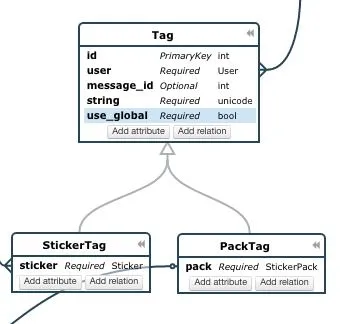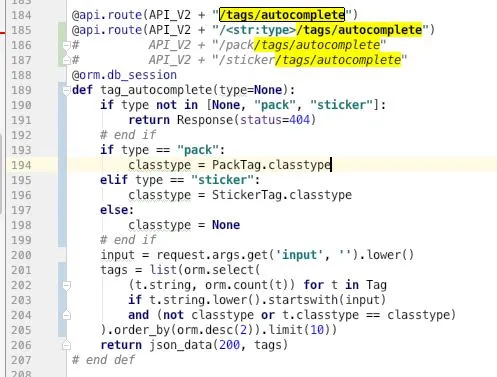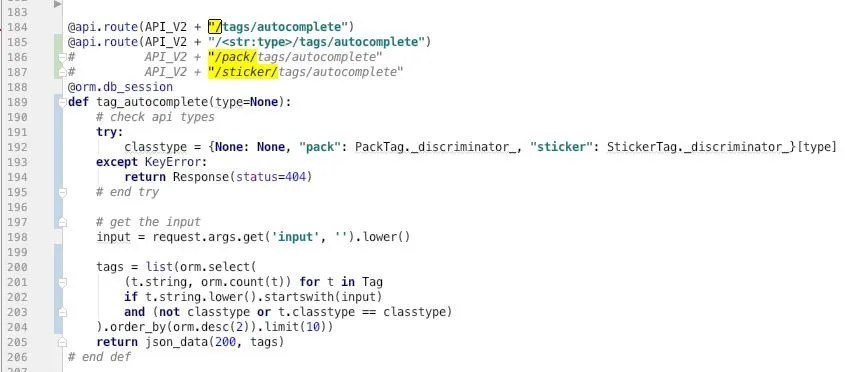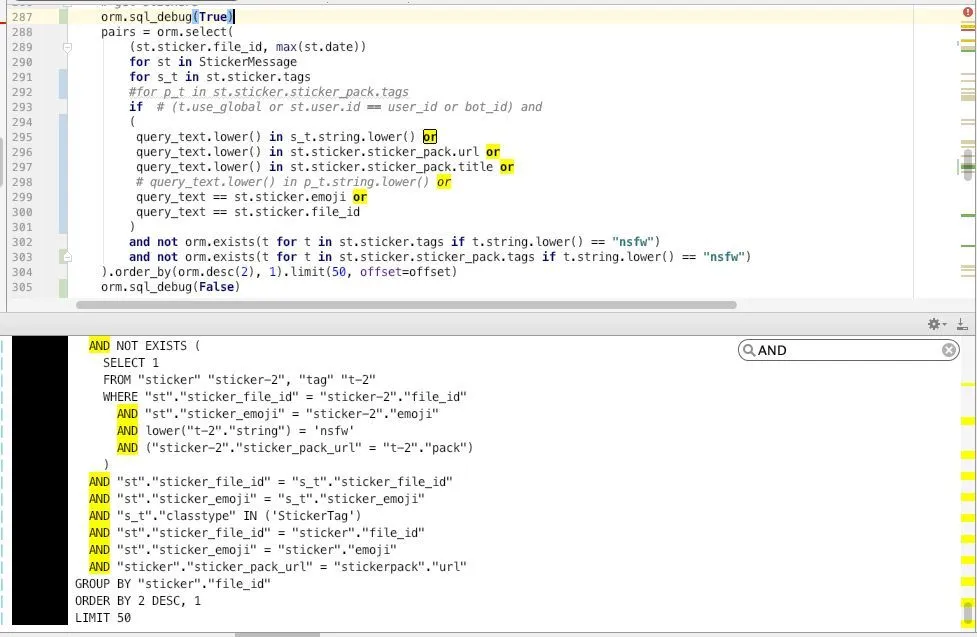 Alexander
Alexander
Federico I know that many developers try to separate modules and apply @db_session only to modules which directly perform queries to the database. In my opinion, this is a mistake. The goal of PonyORM is to provide a common way to represent business data, and @db_session should wrap entire scope where PonyORM objects are used.
For example, if we have a function which processes HTTP request, it may contain two sub-function. The first one retrieves objects from the database, and the second one uses retrieved objects to render HTML template using Jinja2. In my opinion @db_session should wrap the main function, which processes entire HTTP request.
 Anonymous
Anonymous
yeah I see your point, I should probably make inner functions and wrap the external function
 Alexander
Alexander
I think, one counter-argument may be, "I don't want to allow the ORM to make queries inside template rendering function, because it will lead to N+1 query problem". Indeed, if you use Django or some other usual ORM, it will. But Pony prevents "N+1 query problem" automatically, so this argument is not applicable for PonyORM
 Alexander
Alexander
With Pony there are nothing wrong if you lazy load some attributes in template redering function or in any other place outside of the function which makes the initial query
 Alexander
Alexander
I'm not sure about the article. I think, default behavior in Pony should be good enough for most cases
 Lucky
Lucky

 Alexander
Alexander
if type == 'pack':
tag_class = 'PackTag'
elif type == 'sticker':
tag_class = StickerTag
else:
tag_class = Tag
tags = select(t for t in tag_class if ...)
 Alexander
Alexander
Or, if you pass class name as a parameter, you can do:
tags = select(t for t in Tag if t.classname == param and ...)
 Lucky
Lucky
if type == 'pack':
tag_class = 'PackTag'
elif type == 'sticker':
tag_class = StickerTag
else:
tag_class = Tag
tags = select(t for t in tag_class if ...)
My question is, if I can get StickerTag.classname?
In case I need to refactor later
 Lucky
Lucky
do_tags = Optional(bool, default=None)
Is that possible?
What is the default default of an optinal bool?
 Lucky
Lucky
Thanks for reporting @luckydonald !
Note: I wrote "None" there before.
Not that that is mistaken for the bug
 Alexey
Alexey
do_tags = Optional(bool, default=None)
Is that possible?
What is the default default of an optinal bool?
Default for Optional is None, so you don't need to write 'default=None'
 stsouko
stsouko
Hello!
why then i do:
Emails.get(post_parent=meeting.meeting, post_type=EmailPost.MEETING_REGISTRATION.value)
pony translate it to
SELECT "id", "post_type", "author", "title", "body", "date", "banner", "slug", "post_parent", "special", "classtype"
FROM "Posts"
WHERE "classtype" IN ('Emails')
AND "post_type" = ?
AND "post_parent" = ?
LIMIT 2
[12, 1]
why limit 2?
 Alexander
Alexander
The get method assumes that no more than one object satisfies specified criteria. Pony attempts to retrieve more than one object in order to throw exception if multiple objects were found. Sometimes the query condition is wrong and a very big number of objects satisfy the criteria. Pony adds LIMIT 2 in order not to load all that objects to memory.
 Lucky
Lucky
 Alexander
Alexander
The first is a method of Query, you can use select(...).first() or SomeEntity.select(...).first()
 Anonymous
Anonymous
Hi, everyone. I felt tired of ugly raw SQL queries in my Python code, so I decided to find a database ORM tool with elegant syntax. Found pony! Do you guys like this thing? ☺️
 Lucky
Lucky
I like your website. It looks 100% fancy
It still needs some kind of search field.
Still looking into how to do it (GUI I mean)
 Lucky
Lucky
Still for some reason query_text == st.sticker.file_id doen't seem to work. Maybe I am doing something wrong
 Lucky
Lucky
pairs = orm.select(
(st.sticker.file_id, max(st.date))
for st in StickerMessage
for s_t in st.sticker.tags
# for p_t in st.sticker.sticker_pack.tags
if # (t.use_global or st.user.id == user_id or bot_id) and
(
query_text.lower() in s_t.string.lower() or
query_text.lower() in st.sticker.sticker_pack.url or
query_text.lower() in st.sticker.sticker_pack.title or
# query_text.lower() in p_t.string.lower() or
query_text == st.sticker.emoji or
query_text == st.sticker.file_id
)
and not orm.exists(t for t in st.sticker.tags if t.string.lower() == "nsfw")
and not orm.exists(t for t in st.sticker.sticker_pack.tags if t.string.lower() == "nsfw")
).order_by(orm.desc(2), 1).limit(50, offset=offset)
 Lucky
Lucky
The for p_t in st.sticker.sticker_pack.tags part should actually be included, as well as the query_text.lower() in p_t.string.lower() or to check the Tags on a StickerPack too.
`
 Lucky
Lucky
SELECT DISTINCT "sticker"."file_id", MAX("st"."date")
FROM "stickermessage" "st", "tag" "s_t", "sticker" "sticker", "stickerpack" "stickerpack"
WHERE (lower("s_t"."string") LIKE ('%%' || replace(replace(replace(%(p1)s, '!', '!!'), '%%', '!%%'), '_', '!_') || '%%') ESCAPE '!' OR "sticker"."sticker_pack_url" LIKE ('%%' || replace(replace(replace(%(p1)s, '!', '!!'), '%%', '!%%'), '_', '!_') || '%%') ESCAPE '!' OR "stickerpack"."title" LIKE ('%%' || replace(replace(replace(%(p1)s, '!', '!!'), '%%', '!%%'), '_', '!_') || '%%') ESCAPE '!' OR %(p4)s = "sticker"."emoji" OR %(p4)s = "sticker"."file_id")
AND NOT EXISTS (
SELECT 1
FROM "tag" "t-1"
WHERE "st"."sticker_file_id" = "t-1"."sticker_file_id"
AND "st"."sticker_emoji" = "t-1"."sticker_emoji"
AND "t-1"."classtype" IN ('StickerTag')
AND lower("t-1"."string") = 'nsfw'
)
AND NOT EXISTS (
SELECT 1
FROM "sticker" "sticker-2", "tag" "t-2"
WHERE "st"."sticker_file_id" = "sticker-2"."file_id"
AND "st"."sticker_emoji" = "sticker-2"."emoji"
AND lower("t-2"."string") = 'nsfw'
AND ("sticker-2"."sticker_pack_url" = "t-2"."pack")
)
AND "st"."sticker_file_id" = "s_t"."sticker_file_id"
AND "st"."sticker_emoji" = "s_t"."sticker_emoji"
AND "s_t"."classtype" IN ('StickerTag')
AND "st"."sticker_file_id" = "sticker"."file_id"
AND "st"."sticker_emoji" = "sticker"."emoji"
AND "sticker"."sticker_pack_url" = "stickerpack"."url"
GROUP BY "sticker"."file_id"
ORDER BY 2 DESC, 1
LIMIT 50
 Alexander
Alexander
Still for some reason query_text == st.sticker.file_id doen't seem to work. Maybe I am doing something wrong
It's here: OR %(p4)s = "sticker"."file_id"
 Lucky
Lucky
What is that LIKE ('%%' || replace(replace(replace(%(p1)s, '!', '!!'), '%%', '!%%'), '_', '!_') || '%%') ESCAPE '!' doing?
 Alexander
Alexander
In SQL, LIKE has special symbols _ (which means "any symbol") and % (which means "any number of any symbols"). It is possible that the param value contains these symbols. When we translate Python string in operator, we need to suppress the special meaning of that symbols and treat them as an ordinary symbols
 Alexander
Alexander
And so we replace _ to !_ and % to !% and use ! as an escape symbol which denotes that the following symbol is just a usual symbol without any special meaning
 Lucky
Lucky
I noticed, this will only return stuff when there are st.sticker.tags.
How can I improve the query that e.g. st.sticker.sticker_pack.title.lower() can trigger when there aren't any st.sticker.tags (s_t)?




